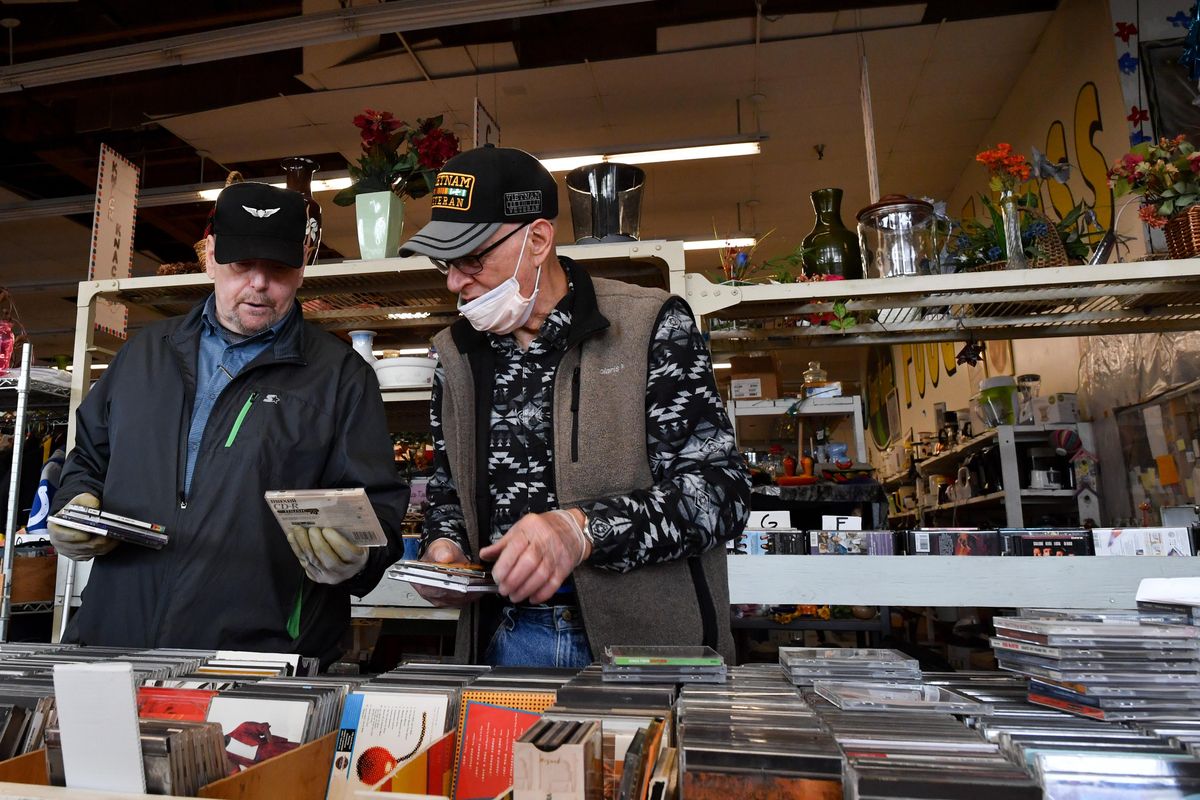Enterprising Spirit: Spokane thrift store provides opportunities for vets during ‘World War C’

Editor’s note: Our series Enterprising Spirit documents how businesses and workers are managing the economy’s slow return to life after its sudden shutdown in March – and adapting to new challenges ahead.
Before Veterans Thrift opened on Tuesday morning, a pile of donations was already forming outside the store.
Donations have tripled since “World War C” – what owner Kevin Oxley calls the COVID-19 pandemic – began earlier this year.
Veterans Thrift Store is more than a thrift store. It’s a place for vets to get household items or clothes they might need, and it’s a place to socialize and find support.
Oxley moved to Spokane a few years ago and started the nonprofit Free Handyman for Disabled Veterans. Oxley volunteered at the VA in Los Angeles, where he lived before moving to Spokane and noticed that a lot of veterans didn’t have help around the house.
“Guys would say, ‘Oh, this is broken at my house and that’s broken and I said, ‘Well, I’ll take a look for you,’ ” Oxley recalled.
But starting a nonprofit from scratch made fundraising in Spokane difficult. When he would call people and ask for donations, they often say they had household items to donate. Thus, Veterans Thrift was born.
It started as more of a swap meet at Oxley’s shop in Spokane Valley, but when his landlord said he had a vacant store front at 4507 West Wellesley Ave, next to Mann-Grandstaff VA Medical Center, Oxley jumped at the opportunity to fix the place up for reduced rent.
“I thought that would be great if I had a building, and then all of a sudden the building came up,” Oxley said. “Just kind of an angel on my shoulder.”
More than three years later, Oxley has started a volunteer program at the thrift store and, in response COVID-19, a small food pantry.
When COVID-19 first shut down businesses, Oxley got a large donation of canned and frozen food and was able to qualify as an essential business.
Donations declined at first, but those in need kept coming in. Veterans can take what they need at no cost, Oxley said.
With an increase in donations as the pandemic has dragged on and people have done their spring cleaning, Oxley said he has plenty of everything.
“Whatever we have, I got so much of it, just go ahead and get what you need,” Oxley said of giving away merchandise.
According to store manager Essadora Tabacci, the most common things veterans need are clothes and shoes.
But in the summer, tents, sleeping bags and tarps are also in demand among homeless vets.
Veterans experiencing homelessness can come to the store and get clean clothes, food, shoes and whatever else they might need. If a veteran is able to get housing, Tabacci and Oxley make sure their apartment is outfitted with the essentials.
“When they finally get their housing, we set them up with everything,” Tabacci said.
People often donate appliances, coffee pots, bed frames and lamps – all things that can be expensive and hard to find for veterans moving into a home.
Oxley said he has passed along 30 cars donated to veterans who need them.
As store manager, Tabacci has facilitated a volunteer program at the store, partially because they need the help sorting and organizing donations but also to make it easier for veterans to “maintain some of their dignity” and take the help they’re being offered.
Frank Swegheimer, 78, started volunteering at Veterans Thrift three weeks ago after COVID-19 eliminated his other volunteer positions.
Swegheimer, a Vietnam veteran, started coming into the store in search of DVDs and CDs after he volunteered at the VA Hospital. Now he spends his volunteer shifts sorting those DVDs and CDs into categories.
Each volunteer gravitates toward a specific part of the store, Tabacci said.
For Swegheimer, the work of sifting through the hundreds of titles available was not only a fun job but also a chance to get first dibs on incoming movies.
The volunteer shifts have led to new friendships for Swegheimer, who enjoys chatting with his fellow veterans who work at the shop.
While donations of items and clothing have skyrocketed, monetary donations have not, Oxley said.
Oxley said his biggest worry is the “same as any other business owner: How am I going to pay the bills?”
The store accepts donations and encourages nonveterans to stop by and shop.